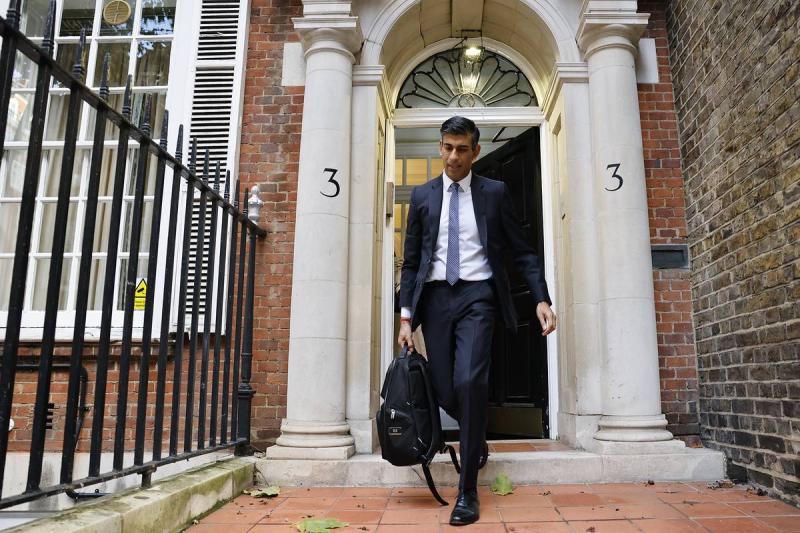
© EPA-EFE/ TOLGA AKMEN/TASS
Last Monday, March 13, British Foreign Minister James Cleverley presented to the House of Commons the updated Integrated Review Refresh 2023: Responding to a more contested and volatile world (hereinafter — the Review). The document identifies the United Kingdom’s two key threats — Russia and China.
In particular, the Review notes that the most urgent priority of the UK's national security and foreign policy in the short and medium term is to eliminate Russia’s threat to European security. The British authorities are really concerned about the planned deepening of Moscow’s partnership with China, as well as growing cooperation with Tehran, which has intensified since the beginning of war in Ukraine.
During Review presentation to the Parliament, British Prime Minister Rishi Sunak was on a visit to the United States, where he made a fiery speech on board the USS Missouri battleship at the Point Loma naval base in San Diego, California. It is Moscow and Beijing that threaten "Western democracies" the most, he said, as the former fights in the European territory, and the latter exercises "economic coercion". Sunak also rebuked Iran and North Korea for threatening, along with Russia and China, to create “a world defined by danger, disorder, and division”.
Besides, the British Prime Minister announced an increase in the kingdom's defense spending by £5 billion over the next two years. This money will go to replenish and strengthen the vital ammunition stocks, modernize nuclear weapons and fund the program to build nuclear submarines under the AUKUS defense partnership (USA, Australia, Great Britain). £3 billion will be allocated for the development of nuclear deterrence forces, and the rest is meant for replenishing stocks that are running dry because of supplies to Ukraine.
UK's present-day military budget is about £48 billion. The latest increase in defense spending took place in 2020 and accounted for £24 billion to hit a post-Cold War record. The British government justifies the current defense budget expansion by the need to respond to growing global instability. In the long term, London plans to increase its military spending to 2.5% of GDP. It is assumed that by 2025, the military spending of the United Kingdom will reach 2.25% of GDP.
Rishi Sunak also outlined the country's sphere of interests: "The UK will remain a leading contributor to NATO and a reliable international partner, standing up for our values from Ukraine to the South China Sea." Primarily a partner to the United States, a country actively involved in the Ukrainian crisis and seeking to confront China in the Indo-Pacific region (IPR).
It follows from Sunak's words that official London has declared 19th-century-style ambitions like Queen Victoria’s "Empire on which the sun never sets." Just a reminder: at the height of its power, Great Britain was the biggest empire in world history, ahead of the Mongol, Roman and Russian ones. Indeed, the sun stopped setting on it at the turn of the XVIII and XIX centuries, after the colonization of Australia. And, most importantly, it still does not set on Britain thanks to the 14 territories it has preserved worldwide since the colonial empire. If these borders remain unchanged, a total solar eclipse over the Pitcairn Islands in the Pacific Ocean in 2432 will make the sun finally set on the modern British Empire for the first time in over 600 years.
However, a reasonable question arises here: does modern Britain have enough strength and capabilities to satisfy its imperial ambitions? It's no secret that the country's economy is obviously declining after Brexit, with its Armed Forces referred to by a number of British lawmakers as "decorative." In turn, Major General Charles Collins is confident that country’s military are no longer able to conduct warfare on their own. If London had fought alone in Ukraine, it would have already run out of ammunition and equipment, he said. This fact is also recognized by British Defense Secretary Ben Wallace, who recently said that the UK army’s military equipment is “in dire need of replacement amid the conflict in Ukraine.” In his opinion, “the army has been obsolete for about 15 years, and we really need to replace it."
But London keeps arming the Kiev regime. Thus, November 2022 saw Rishi Sunak announce that the UK has sent £2.3 billion in 2022 to Ukraine, and promise to go on with military support and send Zelensky 125 anti-aircraft guns, special equipment to boost air defense, and combat drones. In his turn, Ben Wallace did not exclude supplies of longer-range missiles, namely an additional 600 high-precision Brimstone air-to-ground missiles, about 30 AS-90 self-propelled artillery units and 14 Challenger 2 battle tanks. As stated by Chief of the General Staff Gen. Patrick Sanders, the transfer of these weapons to Kiev would weaken the British army, "leaving a gap" in reserves and complicating the kingdom's compliance with obligations within NATO.
As a result, Britain turns out to have simply run out of anything able to defend Western "values from Ukraine to the South China Sea," as Rishi Sunak put it, despite all the ambitions or bombastic rhetoric by official London. Moreover, the British authorities’ willingness to confront Russia in Ukraine and China in the IPR will have to be paid for by ordinary people, because increased military spending entails cuts in a number of other budget items like education or medicine.
As for the notorious "danger" coming from Russia and China, London uses this kind of statements as a mere pretext for a war cost build-up. And Britain should not complain about Moscow’s recent rapprochement with Beijing. None of our enemies has contributed to this as much as the Anglo-Saxons have with their high-handed and arrogant behavior on the world stage.









